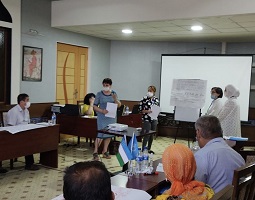WHO–USAID project supports Uzbekistan to increase capacity for the programmatic management of drug-resistant tuberculosis

WHO
The joint WHO–United States Agency for International Development (USAID) project “Improved Prevention, Detection and Treatment of Drug-Resistant Tuberculosis (DR-TB) in Central Asia” is technically assisting Uzbekistan’s Ministry of Health and National Tuberculosis Programme to implement the latest WHO recommendations on the clinical and programmatic management of DR-TB.
Over the last few years, WHO has issued several publications with recommendations on the diagnosis, treatment and prevention of DR-TB, and many other important recommendations on case management.
A series of training sessions on the programmatic management of DR-TB for regional TB specialists in Uzbekistan was organized between February and May 2021 within the framework of the joint WHO–USAID project and in collaboration with the Ministry of Health and the National Tuberculosis Programme.
In total, 35 training sessions were conducted, covering all regions of the country. The sessions aimed to improve the knowledge of regional-level specialists on the diagnosis and treatment of TB and DR-TB. They focused on the prevention, early detection and treatment of DR-TB, as well as longer and shorter treatment regimens, clinical monitoring, management of adverse events and TB laboratory diagnosis.
During the sessions, participants discussed thematic cases and practised situational analyses. Trainers used pre- and post-testing to evaluate participants’ knowledge gain. Within the timeframe of the project, more than 600 TB specialists were trained and rewarded with a certificate for their active participation.
Training sessions for TB doctors will lead to a more effective approach to treating TB patients and increase positive outcomes of DR-TB treatment in Uzbekistan.



